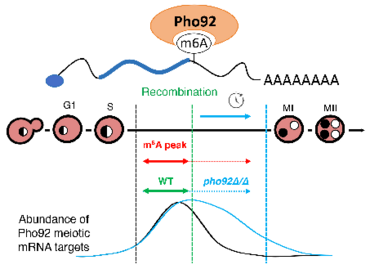Pho92 binds m6A residues to modulate messenger RNA levels and control meiotic recombination
The m6A residues, the most common internal modifications of eukaryotic messenger RNAs (mRNAs), contribute to various biological and pathological processes from yeast to humans. In this study published in the journal Nucleic Acids Research, scientists focus on the function of m6A residues. While many m6A sites have been catalogued, their roles remain generally unknown. To address this problem, the researchers studied the yeast protein Pho92 known to recognize m6A residues. By mapping the sites bound by Pho92, they show that this factor modulates the level of mRNA encoding gene recombination factors during meiosis. Unexpectedly, the removal of a single m6A site from a key transcript alters its level and is sufficient to affect the efficiency of meiosis.

The m6A residues are formed by post-transcriptional methylation of adenosine groups in mRNAs. These modifications are deposited in a targeted manner and approximately one in a thousand adenosines is modified in this way. The m6As contribute to the regulation of gene expression, in particular by stimulating mRNA degradation. Various sequencing techniques have identified thousands of modified sites, but it is not known what fraction of these sites are functional or precisely how they act. In yeast, m6As are found during meiosis and sporulation, which are the equivalent of mammalian gametogenesis.
In this paper, scientists study the yeast protein Pho92, a factor whose physiological function had not yet been characterized. Pho92, which recognizes m6A sites, is indeed a tool to understand their function. The researchers show that Pho92 is specifically expressed during meiosis and that its absence disturbs this process. The work highlights that in the absence of Pho92, the transcripts of a group of genes encoding meiotic recombination factors last longer than in wild type cells. By combining high-throughput RNA sequencing with the mapping of Pho92-targeted sites in mRNAs, the researchers observe that this factor contributes to their down-regulation at the beginning of the first of two meiotic divisions. In particular, they show that mutation of individual m6A sites in key Pho92-targeted mRNAs alters the temporal control of their expression. Counterintuitively, removal of a single m6A site present in REC8 mRNA encoding an essential factor for meiotic recombination is sufficient to delay meiosis. In the absence of m6A, Pho92 shows no significant binding to mRNAs indicating that its function is entirely dependent on this modification.
This study, described as a "Breakthrough" by the editor, provides a better understanding of the mechanisms by which mRNA modifications control expression. Some of the information obtained can be transposed to mammals and plants where factors homologous to Pho92 are present. These results could thus contribute to increase our understanding of germ cell biology as well as to an explanation of certain fertility defects caused by alterations in m6A reading proteins.
